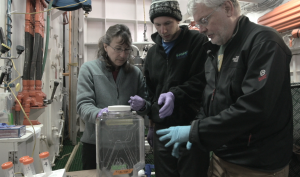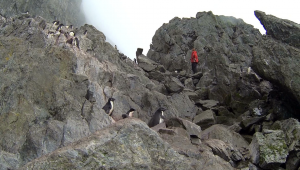In an interview at Columbia University, Hugh Ducklow discusses his experience as leading scientist of the Palmer LTER Project. Behind a calm and collected face, Hugh reveals that he had been working collaboratively with the LTER crew for 18 hours a day for each of the 30 days of the trip while managing his own individual research.
While the LTER Project involves significant research at the molecular level, heavy research is emphasized on the Adélie penguins as their population has declined by 80% since 1975. One of the projects Ducklow had managed involved scientists continuing research of the Canyon Hypothesis. The Canyon Hypothesis, which Ducklow had also co-authored, suggests that many groups of Adélie penguins have chosen particular canyons that provide some benefit to the penguins; what benefits specifically, however, is still in question.
“We have no idea why the penguins are perched on the side of this cliff like they are. But it’s hard for the people to get up there. It’s harder for the people than the penguins to do it, actually,” Ducklow says.
During a trip to Charcot Island, Hugh waited anxiously with several other scientists for members of the crew, called birders, who were sent to collect data from the penguins residing among the cliffs.
Collecting this data presented several challenges. The birders had to be sent out on a separate boat, as large glaciers prevented the main ship from going too close to Charcot. Once there, the birders climbed rocky cliffs for miles before finally reaching the penguin colony and taking samples and data of the penguins, one by one. Meanwhile, Ducklow and his crew remained in contact with the birders by radio.
The bottom line is that Ducklow and the team are determined to understand the micro and macro elements of their research to help shape the future of climate change. Ducklow notes, with urgency:
“We’ve got some big puzzles to solve. We want to know why Antarctica is warming. We want to know why America as a civilization won’t wake up and take climate change seriously. We want to solve the puzzle of how we’re going to keep this planet surviving for the next hundred years.”





 Follow the
Follow the  Subscribe to the blog RSS feed
Subscribe to the blog RSS feed